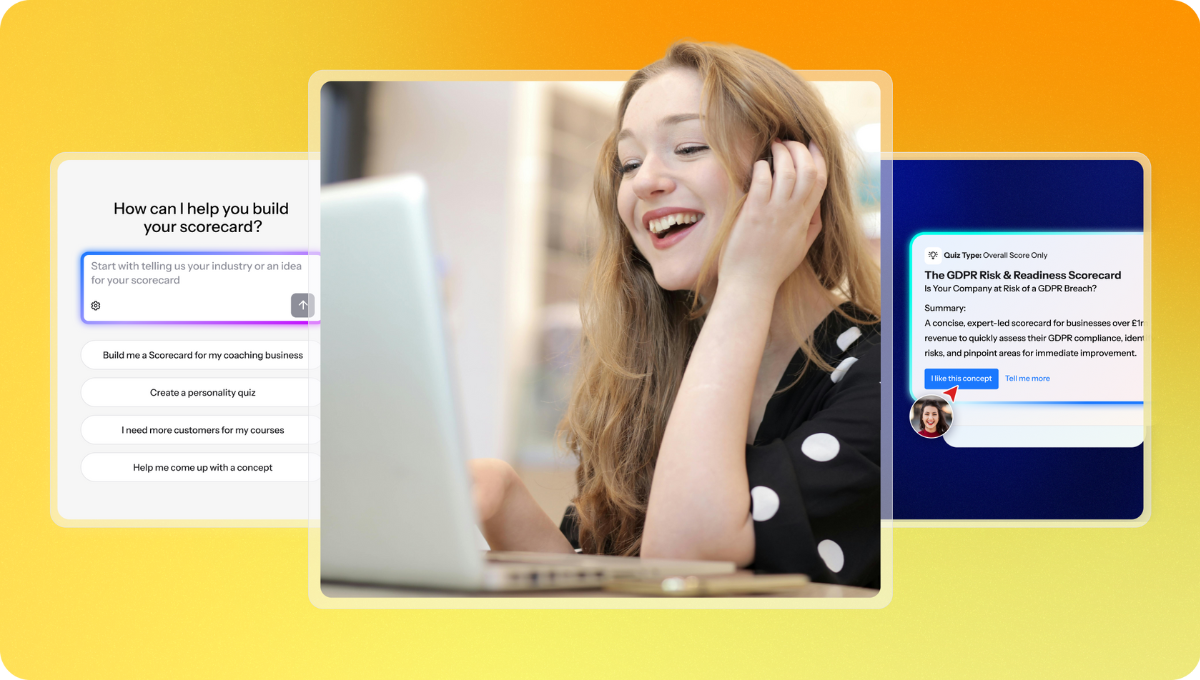How to make better product or service recommendations using quizzes


Do you offer different products or services? Then it can be tricky to help your customers understand which one would benefit them the most.
So, the majority of businesses try to sell ‘everything’ to ‘everyone.’ But how many more products would you sell if you could always recommend the PERFECT one for each customer?
Well, that’s exactly what a quiz will do for you! Let me walk you through the steps to plan, create and optimise a strategic one. That way, it’ll keep on selling in the background for you – and you’ll avoid these extremely common problems.

Why is it risky to let your customers pick the product or service themselves?
Because they could make the wrong choice! And here’s what usually happens when they do:
- Disappointment – Even though it’s not your fault (and you even had another product that would have been the right fit for them), those customers will get frustrated and annoyed at your business
- Low price, high cost – Without guidance, some people will just choose the cheapest option even if it’s not right for them. Not only does that mean less money for you: it probably won’t solve your customer’s problem either (perhaps you had created it with a different audience segment in mind?). So, they’ll also feel tricked and resent your business
- Returns – From the wrong shade of foundation to a laptop that doesn’t match their gaming needs, it’s easy for customers to buy the wrong product or model. This will often lead to returns, which will cost you both time and money
It’s much safer to guide your audience and help them pick the best product for them using a quiz. They’ll get the perfect solution, and you’ll gain more happy customers without wasting money: everyone wins!
How to create a quiz that sells strategically 24/7
Think of your quiz as a valuable lead magnet. By asking specific questions, it’ll create a useful report or recommendation for your target customers – and they’ll need to give you their email address to receive it.
Now, let’s plan and make this quiz!
1. Write down all of your products and services
Create a comprehensive overview and breakdown of your product or service suite (for example, in a spreadsheet). Include:
- What they are
- How much they cost
- What features and benefits they include
- How they take your customers from A to B
2. Identify your target audience for each product
Depending on your business model, you might have multiple target audiences or different segments. After all, your most budget-friendly option is unlikely to attract the same type of customers who can easily afford a solution with three zeros.
So, for each of your audiences or segments, get clear on:
- The problems they’re experiencing (e.g. they’re not getting enough leads for their business)
- What they’re hoping to achieve (e.g. a full and reliable lead pipeline)
- What they’ve already done to try and solve their problem (e.g. they introduced a referral programme to encourage past clients to recommend their services to their peers)
- What’s stopping them from taking action and solving this problem right now (e.g. they’ve worked with a marketing agency before and were encouraged to pay for ads that didn’t bring a good ROI)
- Their budget (periodically or as a one-off purchase, depending on your product suite)
- Their values and beliefs (e.g. they think that relying on referrals is still the best strategy)
This will then allow you to find the best product or service for each of your audience segments – no more trying to sell ‘everything’ to ‘everyone’!
For example, as a marketing agency, you could recommend a content marketing strategy to help that business attract new clients organically instead of waiting for referrals.
3. Create a compelling ‘which one is right for you’ quiz
When it comes to using quizzes to generate more leads and sales, the possibilities are ENDLESS. A ‘which one is right for you’, however, is definitely the best option to help your audience make an informed buying decision.
You simply need to ask them very specific and strategic questions to identify what segment they belong to – and, consequently, what product or service you can recommend.
Benefits of a ‘which one is right for you’ quiz
Warm leads – This quiz will attract people who’re actively looking to buy your products or services. So, your conversion rates will be really high
Gratitude and trust – Your audience will appreciate you for helping them find the right solution instead of bombarding them with generic ads and pop-ups
Easier sales – Because you’ll be segmenting your customers, you’ll get to recommend the best option for them and direct them to that product page as soon as they complete the quiz… all automatically! Get ready to watch those sales stream in!
Nurturing – What about the portion of your audience who don’t buy your recommended product immediately? With the right quiz software, you can retain them and send them highly targeted email sequences and sales messages. They’ll be much more likely to convert into customers thanks to your personalised approach and product recommendations
Cons of a ‘which one is right for you’ quiz
Smaller audience – This type of quiz will mainly attract ‘bottom of the funnel’ customers: those who are pretty much ready to buy. It’ll be less appealing to those who have only just found out about your business or still need to be convinced. So, if you’d rather prioritise those prospects instead (and then nurture them with your email marketing strategy), you should consider other types of quizzes – like a personality test or one that’s entirely based on understanding their problem.
4. Create your quiz questions
Your quiz must give you juicy data but also be an interesting and compelling experience for your customers. Otherwise, they’ll get bored or frustrated… and exit your quiz without completing it!
So, plan your questions strategically – and monitor your results after launching your quiz. For example, if you see that many people give up after the 5th question, you should remove it or change it (with ScoreApp, you can A/B test them and then keep whichever option works better).
As for how to plan the actual questions:
- Keep it human – Instead of creating a robotic questionnaire, imagine you’re speaking to your customers face-to-face. You know they’re already interested in buying from you (hurray!). So, your job is now to help them figure out exactly what type of product or service they should choose – without being pushy. Rather than focusing on ‘what should they buy,’ think of it as ‘what would solve their current problem’
- Plan your questions accordingly – Keeping all that in mind, what questions can you ask your audience? Well, that entirely depends on your business model and products or services, but here are some ideas to get your creative juice flowing
If you have a B2B business, your quiz questions could be based around:
- Your customer’s problem – “What are you struggling with the most when it comes to [your type of solution/industry]?”
- Budget – “How much are you willing to invest to solve this problem?”
- Goals – “What are your [industry/type of solution] goals?”
- When they want to achieve them – “Ideally, when would you like to [experience the end result]?”
- Time – “How much time are you currently spending on [what you’ll help them save time with]?”
- Communication – “How would you like us to contact you about the best solution to your problem?” (e.g. email or phone)
If you have a B2C business, your quiz questions could be based around:
- Your customer’s problem – “What are you struggling with when it comes to [your type of solution/industry]?”
- Budget – “How much would you be happy to spend to solve this problem?”
- Likes and dislikes – e.g. let’s say you run a meal delivery service: “What type of meals do you enjoy the most?” or “Are you following a specific diet or lifestyle?”
- ‘This or that’ – “Do you prefer X [e.g. standalone boxes] or Y [e.g. weekly deliveries]?”
- Minimum requirements – “What do you value the most from a [e.g. meal delivery service]?”
- How fast they want it –“Ideally, when would you like to get started with [e.g. your first delivery]?”
- Create a clear and personalised results page
Personalisation leads to a 20% increase in sales! And while a quiz is already the best tactic to harness it, you want to focus on personalisation even after your prospects have completed it.
- Go beyond a black-and-white result or standalone percentage – For example, ScoreApp allows you to create personalised Scorecards. These can be divided into categories, and they’re a lot more effective: they show people what they’re already doing well and what can be improved
- Create a clear results page with a personalised product or service recommendation – Make it relevant to the answers they gave, and show them why you think this would be the best choice for them. That way, they’ll feel like they’re getting a bespoke service rather than a generic sales pitch! Then, end their results with a strong call to action linking to that product page on your website
- Don’t forget to nurture those who don’t buy it straight away – As mentioned before, not every single person will purchase that product immediately. So, remember to include personalised email sequences to boost your conversion rates even further
Product recommendations quiz examples
Below, I’ve included a few examples of how you could use a recommendation quiz in your business.
SaaS Project Management Tool Quiz
Your customer’s problem: “Which of the following tasks is most time-consuming for your team?”
Budget: “What is your annual budget for a project management tool?”
Goals: “Which of these objectives is a top priority for your business this year? Efficient task tracking, Improved communication, or Reporting and analysis?”
Time Frame: “When would you like to implement this solution?”
Communication: “Would you prefer an online demo or a phone call to learn more?”
Result: “Based on your answers, we recommend our ‘Premium Project Management Suite’. It offers efficient task tracking and in-depth reporting, which aligns with your business’s goals. Schedule a demo with us!”
Digital Marketing Agency Quiz
Your customer’s problem: “Which marketing channel is currently least effective for your business?”
Budget: “How much do you allocate monthly for digital marketing?”
Goals: “What’s your main goal? Brand awareness, Lead generation, or Customer retention?”
Time Frame: “When would you like to kick off your campaign?”
Communication: “What’s the best way to discuss our tailored proposal? Video call or Email?”
Result: “Given your focus on lead generation and your budget, our ‘Lead Generation Power Pack’ would be ideal. Let’s chat!”

Office Equipment Supplier Quiz
Your customer’s problem: “What office equipment are you finding the most outdated or ineffective?”
Budget: “What’s your budget range for new office equipment?”
Goals: “What’s your priority? Ergonomics, Sustainability, or Modern design?”
Time Frame: “By when do you need the equipment?”
Communication: “Do you want a catalog emailed or a sales rep to visit your office?”
Result: “Based on your needs for sustainable equipment, we recommend our ‘Green Office Collection’. Request our catalog now!”
Online Fashion Store Quiz
Your customer’s problem: “Which clothing items do you find hardest to shop for?”
Budget: “How much do you typically spend on a single clothing item?”
Likes and dislikes: “Which style do you prefer? Vintage, Contemporary, or Athletic?”
‘This or that’: “Do you prioritize comfort or style?”
Minimum requirements: “What do you value most in clothing? Durability, Brand, or Versatility?”
Time Frame: “When’s the next big event you’re shopping for?”
Result: “Considering your love for vintage style and prioritizing comfort, we recommend our ‘Retro Comfort Collection’. Check it out!”
Meal Kit Delivery Service Quiz
Your customer’s problem: “What do you struggle with most in meal planning?”
Budget: “What’s your weekly budget for meals?”
Likes and dislikes: “Which cuisine do you enjoy the most?”
‘This or that’: “Are you more into vegan meals or meat-heavy dishes?”
Minimum requirements: “Is organic produce a must-have for you?”
Time Frame: “How many days a week would you like meals delivered?”
Result: “Given your preference for organic, vegan meals, our ‘Organic Vegan Delight’ plan seems perfect. Start your tasty journey with us!”
Which quiz software can you use?
Once you have decided what kind of quiz you want to build, now you have to find the right quiz software.
We’ve put together a list of the best quiz software on the market so you can find the right one for you no matter what your budget or requirements.
We also have dozens of quiz templates that you can browse to find one that suits you.
Create your first ‘which one is right for you’ quiz for FREE
Once you get your quiz live, you’ll bypass those product-fit problems and skyrocket your sales.
So, why not get started today? At ScoreApp, you can create a free account and build your first quiz in less than 5 minutes using our AI Quiz Builder.



